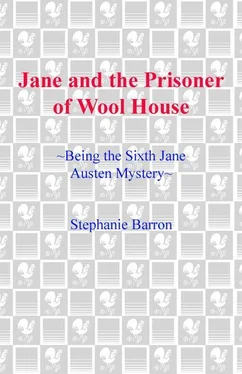Stephanie Barron - Jane and the Prisoner of Wool House
Здесь есть возможность читать онлайн «Stephanie Barron - Jane and the Prisoner of Wool House» весь текст электронной книги совершенно бесплатно (целиком полную версию без сокращений). В некоторых случаях можно слушать аудио, скачать через торрент в формате fb2 и присутствует краткое содержание. Жанр: Исторический детектив, Иронический детектив, на английском языке. Описание произведения, (предисловие) а так же отзывы посетителей доступны на портале библиотеки ЛибКат.
- Название:Jane and the Prisoner of Wool House
- Автор:
- Жанр:
- Год:неизвестен
- ISBN:нет данных
- Рейтинг книги:4 / 5. Голосов: 1
-
Избранное:Добавить в избранное
- Отзывы:
-
Ваша оценка:
- 80
- 1
- 2
- 3
- 4
- 5
Jane and the Prisoner of Wool House: краткое содержание, описание и аннотация
Предлагаем к чтению аннотацию, описание, краткое содержание или предисловие (зависит от того, что написал сам автор книги «Jane and the Prisoner of Wool House»). Если вы не нашли необходимую информацию о книге — напишите в комментариях, мы постараемся отыскать её.
Jane and the Prisoner of Wool House — читать онлайн бесплатно полную книгу (весь текст) целиком
Ниже представлен текст книги, разбитый по страницам. Система сохранения места последней прочитанной страницы, позволяет с удобством читать онлайн бесплатно книгу «Jane and the Prisoner of Wool House», без необходимости каждый раз заново искать на чём Вы остановились. Поставьте закладку, и сможете в любой момент перейти на страницу, на которой закончили чтение.
Интервал:
Закладка:
I hesitated on the paving-stones before the door. If Mrs. Seagrave already entertained a visitor, I could scarcely be wanted. I did not like the duty that awaited me in any case, and should relish the opportunity to avoid it. The lady must be presently in a pitiable state, and the visit of a relative stranger might oppress rather than sustain her. Surely, if the lady of a baronet had come to call—
All these excuses and more flooded into my mind; but I will confess that I was troubled most by Mary's careless suggestion that Mrs. Seagrave was going mad. Bodily illness I may face without blenching, and all manner of infirmity or dereliction; but a soul unsound in her mind is the most terrifying of spectacles. My own brother George had been born without his full wits, and was banished while still a child to the care of strangers paid well to maintain him. We rarely saw him, and spoke of him still less. I glanced over my shoulder at all the bustle of Lombard Street, the carters shouting for passage against the claims of the elegant equipage, the maidservants trudging over the wet stones in their patterns. When I looked back at the Seagraves' door, the choice was made. Louisa Seagrave was standing at the window, staring at me.
I had taken passage down the Solent. I could not turn from a fellow-creature in torment. I smiled at her, stepped up to the door, and pulled once upon the bell.
The door was immediately flung open by two dark-haired boys who scuffled and shoved at each other in their haste to be first to greet the visitor: Charles and Edward Seagrave. Charles's stock was undone and trailing down his shirtfront; Edward, the younger child, had a bright smear of jam across his forehead. A hunk of bread torn from a loaf was still clutched in his fist.
“Have you any news of Papa?” he demanded without preamble. “Has he been akidded?”
“ Acquitted , you imbecile,” retorted Charles. “Of course he has! Papa could never be guilty of murder, whatever Nancy says.” His large grey eyes, heavily lashed and startlingly like his mother's, turned full upon me. “I've seen you before. You came with Papa's captain friend. You'll be wanting Mum — only she's shut up with Aunt Templeton, the old carcase.”
“I won't go into Kent!” Edward cried shrilly, and dashed his bread at my feet. Involuntarily, I stepped backwards off the threshold. “Not without Papa! Aunt Templeton is a monster?
A delicate clearing of a throat — apologetic and halfhearted — alerted me to the presence of a third person in the dimly-lit hall. I craned my head around the two boys — Edward was now crying bitterly, and Charles was berating him in furious whispers — and glimpsed the shining domed head of an elderly man, exquisitely dressed in silk knee breeches and a coat of black superfine.
“I beg your pardon,” he murmured, coming forward with one hand outstretched. He made me a deep bow in the fashion of thirty years ago, his right leg extended painfully behind him, then raised his quizzing glass to survey my figure. “I am Sir Walter Templeton. Forgive the … ah … high spirits … of the little boys. They are quite overset by events in this house. Quite unruly. There is no managing them. So my wife, Lady Templeton, assures me.”
His words, although stern, were uttered in such failing accents that I wondered at his true convictions: he might have been reciting a verse learned by heart.
“Not at all,” I replied. “I am quite used to boys and their antics. I am happy in the possession of no less than six nephews at present, and shall undoubtedly be blessed with more.”
“How very fortunate,” Sir Walter managed. “I was never so happy as to possess a child of any kind. It has been … a great sorrow.” He glanced down at young Charles, and his elderly face creased in an angelic smile, rendering his countenance unexpectedly carefree and childlike.
“Uncle!” cried Edward. “You promised that we should make paper ships today, and launch them off Sally Port!”
“So I did,” he declared, and laid a hand upon Edward's shoulder. Then casting a furtive glance at me, he added, “I cannot like the oppression of the household at such a time. I thought it best to divert the children with a little harmless sport.”
“Excellent notion,” I agreed — and would have said more, but that the door at the far end of the entrance hall was thrust open with a bang, and the housemaid Nancy hastened forward, her one good eye balefully upon me.
“Leave yer card!” she barked. “The Missus is seeing no one today, as any fool with a heart should know. Disgraceful, to call at such a time, with the Master about to swing at the yardarm!”
“He's not!” cried Charles angrily.
Nancy rounded upon the boy with her hand raised, and found her wrist firmly seized by Sir Walter Temple ton.
“That will do, my girl,” he said in a voice somewhat stronger than previous. “Pray be so good as to present the lady's card to Mrs. Seagrave.”
The maid no doubt intended a stinging rebuke, but Sir Walter had released her and was already steering the two boys firmly towards the kitchen, muttering in quiet tones about the Sally Port, and the necessity of fetching a quantity of paper from the nursery. I proffered the offending card, and grudgingly, the maid took it.
“If your mistress is otherwise engaged this morning, I shall wait for her reply.”
An ejaculation from the parlour doorway must serve as answer enough.
“Miss Austen! You are come again to cheer my solitude!” Louisa Seagrave cried. “Pray do not give the slightest attention to that ill-bred slattern, but hasten to the fire. You must be perishing of cold. Do I understand the situation correctly? Are you only now disembarked from the Southampton hoy?”
I drew off my bonnet and gloves, handed them to Nancy — who crushed them under her arm with a snort of contempt — and crossed the hall. I am. My brother could not be absent from Portsmouth on such a day; and when I learned of his intention, I begged to join him. Do I disturb your peace unforgivably?”
“Not at all.” Her fingers, when she clasped my own, were chilled to the bone. The parlour fire could not be adequate. Her face was sallow, her breathing hectic, and her entire appearance one of the deepest suffering; but I could not judge her mad. “You know, then, where my husband is gone. You know that a few hours alone may decide it.”
“A few hours — and all the most active intelligence of his true friends, exercised upon his behalf,” I declared. “You must not sink, Mrs. Seagrave — you must not give way. Let us talk of books; let us dandle the baby — let us walk out into the cold, if we must! But I shall not allow you to sink!”
“You are very good,” she murmured, and swayed in the doorway. I caught her arm and helped her into the parlour beyond — it was a small room, rather dark, with a single round table placed in the center and two or three chairs arranged around it. I settled Mrs. Seagrave on the sopha crammed into the bow window, and turned to face the second lady standing silently near the hearth. The mistress of the magnificent carriage, I presumed.
“Pray forgive my weakness, Lady Templeton,” Louisa Seagrave murmured, “and allow me to introduce Miss Austen to your acquaintance.”
Her ladyship was an austere personage, thin and tall, with a magnificent carriage to her head and a pair of glowing dark eyes. I should judge her a quarter-century junior to her husband, and where the Baronet was all diffidence and kindly hesitation, she was all decision and contempt. Like Louisa Seagrave, Lady Templeton was dressed entirely in black, though of an elegance the Captain's wife should never achieve. She did not waste her smiles upon a woman only just disembarked from the Southampton hoy; it was unlikely we should meet again, and a baronet's wife must always be sparing in her notice. A stiff nod, which I returned with my usual courtesy, was all the acknowledgement I received.
Читать дальшеИнтервал:
Закладка:
Похожие книги на «Jane and the Prisoner of Wool House»
Представляем Вашему вниманию похожие книги на «Jane and the Prisoner of Wool House» списком для выбора. Мы отобрали схожую по названию и смыслу литературу в надежде предоставить читателям больше вариантов отыскать новые, интересные, ещё непрочитанные произведения.
Обсуждение, отзывы о книге «Jane and the Prisoner of Wool House» и просто собственные мнения читателей. Оставьте ваши комментарии, напишите, что Вы думаете о произведении, его смысле или главных героях. Укажите что конкретно понравилось, а что нет, и почему Вы так считаете.












